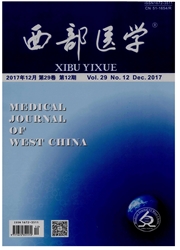

 中文摘要:
中文摘要:
目的探讨HMGN2对肺炎克雷伯氏杆菌耐药性的影响。方法分离、纯化并鉴定兔胸腺组织HMGN2。用质粒提取试剂盒提取耐药肺炎克雷伯杆菌中的质粒pMG252,PCR扩增其耐药基因qnrA;凝胶阻滞实验检测HMGN2与耐药质粒pMG252及qnrA基因结合;用不同浓度的HMGN2刺激培养肺炎克雷伯氏杆菌,然后用试管二倍稀释法测定环丙沙星对其MIC值的改变,微量法测定细菌的生长曲线,检测HMGN2对耐药菌株耐药性的逆转效果;将重组HMGN2及耐药质粒pMG252转化到大肠杆菌DH5α中,检测重组HMGN2对细菌耐药性的影响。结果HMGN2可明显阻滞pMG252质粒及qnrA基因的泳动速率,且随HMGN2浓度增加,qnrA基因的泳动速率逐渐减慢;15μg/ml HMGN2与细菌共孵育后,环丙沙星对耐药肺炎克雷伯氏杆菌的MIC值明显下降,且该耐药株的生长与对照组和低剂量组相比明显的受到抑制;pET-32a-c(+)-HMGN2重组表达质粒可时环丙沙星对大肠杆菌DH5μ的MIC值明显小于其对照组,下降到其1/16。结论HMGN2能有效逆转含耐药质粒pMG252的肺炎克雷伯氏杆菌等对喹诺酮类抗生素的耐药性。
 英文摘要:
英文摘要:
Objective To explore the effect of HMGN2 on drug resistance of Klebsiella pneumoniae. Method HMGN2 was extracted from rabbit thymus gland tissue which was purified and identified then. The resistance plasmid pMG252 was abtained from resistant Klebsiella pneumoniae with DNA extraction kit, and PCR amplification was done to get the resistance gene qnrA. The binding activity of HMGN2 to the plasmid pMG252 and qnrA gene was detected by the electrophoretic mobility shift assay (EMSA). With different concentrations of HMGN2 cultured Klebsiella pneumoniae, the MIC of ciprofloxacin for bacteria was detected with twice the dilution test-tube method, and the bacterial growth curve was drawn by micro-determination. At last, HMGN2 recombinant and pMG252 resistance plasmid were transformed into E. coli DH5α to test the effect of HMGN2 recombinant on bacterial resistance. Results The electrophoresis speed of the plasmid pMG252 and qnrA gene could be blocked by HMGN2, and the action was enhanced with the concentration increasing of the HMGN2 molecules. Cultured by HMGN2 at the concentration of 15 μg/ml , the MIC of cipro- floxacin for resistant Klebsiella pneumoniae decreased obviously, and the resistant strains' growth was significantly inhibited compared with that of the control group and the low-dose group. The MIC of ciprofloxacin for pET-32a-c (+)- HMGN2 recombinant group was obviously small than that of the control group. Conclusion HMGN2 can effectively reverse the resistance to quinolones of the bacteria which contain resistant plasmid pMG252.
 同期刊论文项目
同期刊论文项目
 同项目期刊论文
同项目期刊论文
 期刊信息
期刊信息
